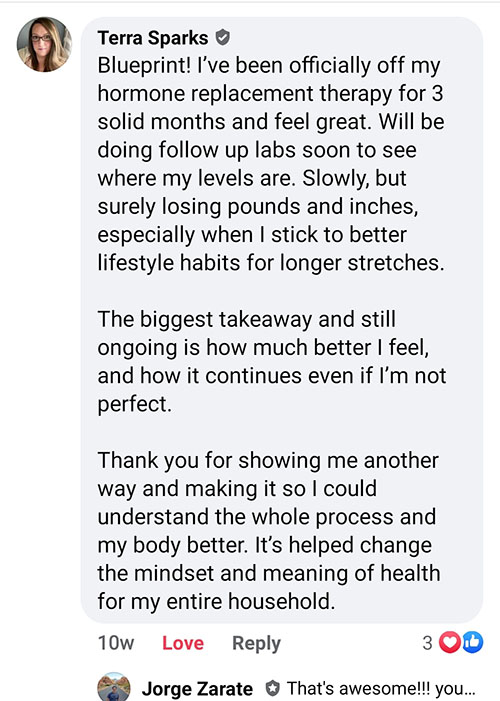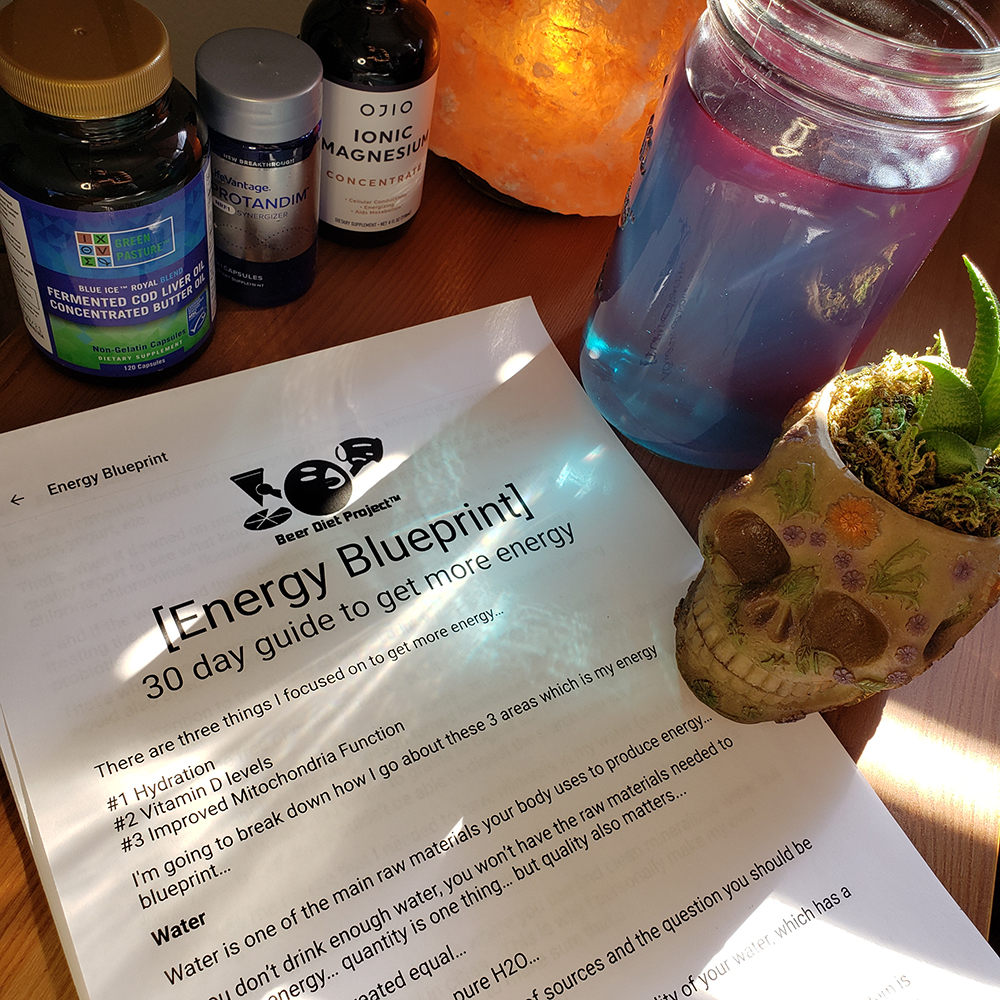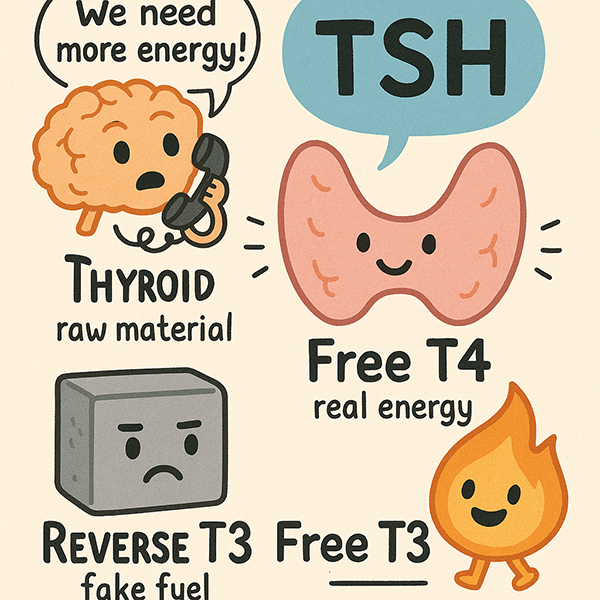The most common advice you’ll hear on increasing thyroid hormone naturally is to eat foods rich in iodine, selenium and zinc… you may get some pep talks about managing stress or getting adequate sleep… if you’ve ever found yourself wide awake at 2:13am, you know that failure to “get adequate sleep” isn’t from lack of trying…
Years ago, I was told that I was going to have to be on thyroid meds for the rest of my life… that I was going to need hormone replacement and there was nothing I could do about it… it was pretty disempowering… that’s when I decided to go on a quest and figure out how to boost my thyroid function naturally…
Can You Increase Thyroid Hormones Naturally?
Let me start with proof that yes, you can boost thyroid hormone naturally…

When Terra found us, she was following the common advice of managing stress and getting adequate sleep… Not only was she getting adquate sleep, Terra actually described her sleep as being excessive…
There’s a big difference between adequate sleep and deep restorative REM sleep… and it’s the reason why this common advice doesn’t work…
If you’ve tried iodine, selenium, zinc and adequate sleep and it didn’t work… it’s not because you failed… you were just misled…
How to Raise Thyroid Hormones Naturally
There are three nutrients that your body needs more than anything else to increase hormone production…
#1 Cholesterol
#2 Saturated fat
#3 Vitamin D
What food group contains all three of these nutrients?
Dairy…
… but the problem is that some people have dairy intolerance… so challenge now shifts from boosting thyroid function naturally to improving digestion so that you can incorporate dairy into your diet…
Iodine, selenium and zinc won’t help you achieve this… the first question you have to ask is this:
How does gas, bloating and constipation affect thyroid hormone levels?
Thyroid hormone needs two things: iodine and tyrosine.
Tyrosine is an amino acid that you would typically get from protein…
Suppose you follow the advice you typically get like eating seafood (salmon, etc.), eggs and other lean meats to get iodine and healthy fats… but then at 2pm you find yourself with bloating so bad, you have to unbutton your jeans… your stomach gurgles loudly that you wish for a private restroom with no one around…
What’s happening here is that your body is not digesting food properly… this means that protein is not being broken down into amino acids… if you can’t digest protein, then you can’t get the amino acids your body needs to produce thyroid hormones…
Other signs that you are not breaking down protein properly is if your hair starts thinning or falling out…
This is not a problem that iodine, zinc or selenium can solve… this is a problem that starts with a very basic foundation of diet that few people talk about: Hydration.
How feeling tired, but wired keeps you from producing thyroid hormones
Getting deep REM sleep is essential for hormone production… if you are not getting this kind of deep restorative sleep, then you are not producing hormones…
I used to come home from work and I’d have to push myself to make it through dinner… there’d be times I’d sit in the kitchen not moving because I was so wore out… If I managed to cook and clean, I’d be in tears by 8 o’clock trying not to fade… you would think I’d be out the moment my head hit the pillow…
… but that was not my typical evening… despite feeling exhausted all day, I would find myself struggling to fall asleep… my mind would start racing and my anxiety would start ramping up… this tired but wired feeling means one thing… inflammation…
Inflammation comes in two flavors… one is from high stress and the other from blood sugar spikes… what happens then is that in the middle of the night, your blood sugar begins to crash and your body reacts by sending a rush of adrenaline to counter the blood sugar crash… this is how you end up wide awake between 1-3am… right when your body is supposed to start getting into REM sleep…
You then find yourself tossing and turning until it’s time to get up… no wonder you end up with brain fog and feel like a walking zombie..
What helps in this case is vitamin D… but there’s a caveat…
How to use vitamin D to increase thyroid hormones naturally
When people think of vitamin D, they usually think sun exposure or vitamin D3…
While sun exposure is natural, many people are not able to get enough sun exposure without getting sunburnt because of the toxins in their body… this is one reason why you’ll also see “avoiding toxins” as common advice to boost your thyroid naturally…
… but most of the toxins in your body don’t come from chemicals in cleaning products… they come from bad bacteria in your gut flora… when you have bad bacteria in your gut, your body will produce toxins every time you eat, regardless of your food being organic, regenerative, etc.
When you have bad gut flora, you also start seeing your vitamin D levels decline…
Without vitamin D, you can’t produce hormones and so you end up tired and feeling cold all the time… if you do happen to find out your vitamin D levels are low, then you are likely to fall for the vitamin D booby trap… vitamin D3…
Vitamin D3 is not natural vitamin D…
If you want to produce thyroid hormones naturally, then you need to avoid vitamin D3 supplements… here’s why:
Vitamin D3 is a “marketing name” for a chemical called “cholecalciferol…”
Cholecalciferol is made by taking sheep’s wool and irradiating it with UV light… there’s nothing natural about this, and supplement manufacturers know that you are more likely to take their supplement if it’s labeled Vitamin D3 as opposed to cholecalciferol…
So what is the natural way to increase your vitamin D levels?
All vitamins are created by probiotics through digestion and fermentation… this is why if your gut flora is weak, your vitamin D levels being going down… this becomes a vicious cycle because probiotics in your gut flora are supposed to make vitamin D for you, but the weaker they get the less vitamin D you get… the less vitamin D you get the weaker your gut flora get…
This is why fermented foods and beverages have always been a part of ancestral nourishment and traditional medicine…
There is one fermented food that has naturally occurring vitamin D and that is fermented cod liver oil…
The difference between cod liver oil and a vitamin D3 supplement is that fermented cod liver oil has naturally occurring vitamin D that is bioavailable and ready for your body to uptake and use…
Vitamin D3 supplements have a synthetic compound that your body may or may not be able to utilize… that’s why vitamin D3 supplements have to be dosed around 3,000 to 5,000 IU’s… because when you take more than that, you can get vitamin D toxicity…
Fermented cod liver oil on the other hand, doesn’t have a dose… because it’s natural… you can take as much as you need and all that happens is that you start to sleep amazing…
When you start to get deep restorative sleep, you will see your body start to naturally produce thyroid hormones without the need for medication despite all the naysayers you may find on Reddit or other social media…
How low-fat and low-carb foods are affecting your thyroid hormone production
Ever feel sugar cravings after eating a meal?
Maybe you manage to make it through the day without cheating, but something stressful tips you over and suddenly you find yourself munching on potato chips to ease salt cravings…
These cravings aren’t there by accident… when your sleep sucks your body will crave sugar or salt as a way to signal it’s lacking nutrients… this is part of what makes it harder to lose weight…
What then tends to happen is that people start eating low fat or low carb diets because they think that’s the way to lose weight… the problem is that your body needs both adequate carbs and fats to produce hormones…
If you read the previous section on vitamin D, then you should know that vitamin D is the key to sleep… and the key to increase your vitamin D levels is to increase your healthy fat intake… because vitamin D is a fat soluble vitamin…
Once you understand these three things, you’ll start to see why so many people are unable to produce thyroid hormones no matter how many supplements they take or what type of diet they eat… it doesn’t matter if they go keto, vegan, or carnivore because they are not doing the things their body needs to produce hormones…
Dietary Strategies:
#1 Hydration
#2 Boost vitamin D levels
#3 Increase saturated fat intake
I know this is very different than the typical “increase iodine, zinc, selenium, manage stress, etc.”
So I want to share another success story from Janae who was able to increase her thyroid function naturally by following these principles:
How to Get Natural Energy without Restrictive Diets or Supplements
If you are still tired after doing everything that doctors told you to do, maybe even got your labs to “normal”, but you don’t feel normal, then you might be interested in our Energy Blueprint where we walk you through three steps to get your energy back and feel like yourself again without restrictive nutrition plans or supplements…

To learn more about our Energy Blueprint we’ve put together a free 5-Day Energy Challenge that gets you:
- Better sleep so you wake up feeling truly rested… your mind will feel clear and focused… no more dragging through the day, just steady energy and sharp thinking from morning to night.
- Reduced inflammation so you watch the puffiness fade… your belly feel flat and light… your clothes fit better, and you feel at home in your body again.
- Better brain function so you feel the fog finally lift. You follow conversations with ease, words come naturally, and your mind feels quick and clear… like you’re fully present again, not struggling to keep up.
- Hair that starts to feel fuller and softer again, and your skin glowing naturally looking smoother, and firmer.
- Feel your strength return… you’ll move around easily, get things done without needing to rest every few minutes, and by the end of the day, you still feel steady and sure on your feet.
- You’ll feel calm and steady… even when things go wrong… You’ll respond with patience instead of snapping, and the little things won’t ruin your whole day anymore.
- Gas and bloating finally eases… you feel light in your belly, your clothes fit comfortably again, and you start to recognize yourself in the mirror…
Listen to Janae share her hypothyroidism success story after following these three steps:
Tap “continue” below to learn these 3 steps in more detail and start your 5-Day Energy Challenge:
Summary:
Most women are told the same generic advice to support their thyroid: take iodine, zinc, selenium, manage stress, and get enough sleep. But what if you’re already doing those things and still feel exhausted, puffy, wired at night, and foggy during the day?
That was the reality for so many, including Terra, who was technically “sleeping enough” but still dragging. And for me, too. I followed all the rules. Until I started looking at the body differently, not as isolated parts, but as a whole system.
I discovered that low thyroid isn’t just a gland problem. It’s a communication problem. A digestion problem. A gut and vitamin D problem. A hydration and sleep quality problem. And it’s all connected.
The real path to healing wasn’t another supplement. It started with giving my body the environment to make its own hormones again. That’s when things shifted.
Key Takeaways:
🧪 Iodine, zinc, selenium aren’t magic bullets
These nutrients are helpful, but if you’re not digesting properly or sleeping deeply, your body can’t use them. Supplements won’t fix broken digestion or low energy flow.
💧 Hydration isn’t about more water, it’s about better absorption
Cellular hydration is the foundation. Without it, digestion slows, nutrients don’t absorb, and thyroid hormone can’t be made.
🍽️ If you’re bloated or constipated, your thyroid is suffering
Gas, bloating, or food sitting in your gut means you’re not breaking down protein. No protein digestion = no tyrosine = no thyroid hormones.
😵💫 “Tired but wired” means inflammation is stealing your sleep
If you’re waking up at 2am with a racing heart, it’s not just anxiety, it’s blood sugar crashes and inflammation hijacking your rest. And no deep sleep = no hormone production.
☀️ Low vitamin D = no thyroid hormones
But skip the synthetic D3 supplements. The most bioavailable source? Fermented cod liver oil. It works with your gut and nourishes the body the way nature intended.
🧈 Fat is not the enemy, it’s the building block of hormones
Your thyroid runs on cholesterol, saturated fat, and vitamin D. Low-fat or low-carb diets can starve your endocrine system and trigger more cravings, not fewer.
🌱 Fermented foods are key to restoring gut flora and natural vitamin production
When your gut is healthy, it makes the vitamins you need, including vitamin D… so healing becomes effortless, not forced.
If you want to naturally restore thyroid function, skip the trendy protocols. Start by rebuilding the environment your body needs to do what it was designed to do. Hydrate. Sleep. Nourish. And let the energy flow again.
FAQ’s
What foods raise your TSH levels naturally?
First off, it’s important to understand that low TSH is not a thyroid problem…
Think of it this way… your body is tasked to produce energy… you have the “boss”, which is the brain and then you have the “energy factory” which is the thyroid…
Imagine the boss picks up a special phone TSH to call the energy factory saying “hey, we need more energy… fire it up!”
If the boss doesn’t call the factory enough, then that’s what shows up as low TSH…
If the boss keeps calling, but the thyroid doesn’t answer the call, then the boss starts freaking out and calling more often, which is what shows up as high TSH…

The key takeaway from this is that TSH is a signal… it’s a message that’s not getting through. This means that the food you are eating isn’t giving your thyroid the information it needs to produce thyroid hormone…
The information missing has little to do with the types of foods you eat… it’s not about eating more salmon, seaweed or brazil nuts for iodine, zinc and selenium… the question you need to ask is what do zinc and selenium have in common?
They are minerals…
… and your body needs over 84+ minerals… that’s the information missing in food that keeps your thyroid from getting the signal it needs to function…
What you need more than anything is minerals which is why hydration is so important…
References
Walter L. Miller, Richard J. Auchus, The Molecular Biology, Biochemistry, and Physiology of Human Steroidogenesis and Its Disorders, Endocrine Reviews, Volume 32, Issue 1, 1 February 2011, Pages 81–151. The molecular biology, biochemistry, and physiology of human steroidogenesis and its disorders – PubMed
This article outlines how cholesterol is the initial substrate for all steroid hormone synthesis, starting with its conversion into pregnenolone in mitochondria.
Whittaker J, Wu K. Low-fat diets and testosterone in men: Systematic review and meta-analysis of intervention studies. J Steroid Biochem Mol Biol. 2021 Jun;210:105878. doi: 10.1016/j.jsbmb.2021.105878. Epub 2021 Mar 16. PMID: 33741447.. Low-fat diets and testosterone in men: Systematic review and meta-analysis of intervention studies – PubMed
This meta-analysis demonstrates that low-fat diets, particularly those low in saturated fat, are associated with decreased testosterone levels in men, emphasizing the role of dietary fat in hormone production.
Mora JR, Iwata M, von Andrian UH. Vitamin effects on the immune system: vitamins A and D take centre stage. Nat Rev Immunol. 2008 Sep;8(9):685-98. doi: 10.1038/nri2378. PMID: 19172691; PMCID: PMC2906676. Vitamin effects on the immune system: vitamins A and D take centre stage – PubMed
This review outlines how vitamin D interacts with immune cells, influencing both innate and adaptive immune responses, and plays a role in preventing excessive inflammation.
